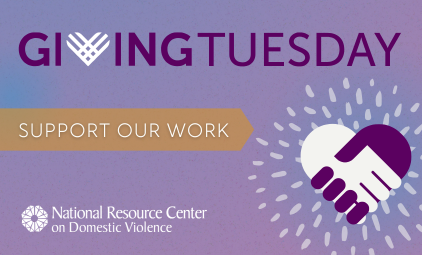by Ivonne Ortiz for the National Resource Center on Domestic Violence
Engaging in self-care practices is important for all victim advocates. On a daily basis, advocates are exposed to trauma through the stories of the survivors that we work with – whether the stories are heard in person, in writing, over the phone or through social media. Constant exposure to any type of trauma can take a toll on an advocate’s well-being. As advocates, we carry these stories in our hearts and usually do not realize that we are also carrying the effects of compassion fatigue.
What is Compassion Fatigue?
The term compassion fatigue was first used two decades ago by a nurse called C. Joinson. At that time, Joinson coined the term to describe the ‘loss of the ability to nurture’ that was noted in some nurses in emergency department settings. Compassion fatigue has also been described as the “cost of caring” for others in emotional and physical pain (Figley, 2002). The symptoms can often be displays of stress resulting from the work we perform on a regular basis. According to the Compassion Fatigue Awareness Project, some of the symptoms can include:
- Bottled up emotions
- Isolation from others
- Compulsive behaviors such as overspending, overeating, and gambling,
- Poor self-care (i.e., hygiene, appearance)
- Reoccurrence of nightmares and flashbacks to traumatic events
- Chronic physical ailments such as gastrointestinal problems and recurrent colds
- Apathy, sadness, loss of interest in previously pleasurable activities
- Difficulty concentrating
- Mental and physical fatigue
- Use of substance abuse to mask feelings
The expectation that we can be immersed in suffering and loss daily and not be touched by it is as unrealistic as expecting to be able to walk through water without getting wet.” (Remen, 1996)
Note: If would you like to assess your current level of compassion fatigue, visit Dennis Portnoy’s From Overextended and Undernourished: A Self-Care Guide for People in Helping Roles.
Taking Small Steps to a Healthier You
We all know that our goal as advocates is to meet the physical and/or emotional needs of the survivors we work with. This can be a rewarding experience, and for most, the daily contact with survivors is what keeps us working in the gender-based violence field. As fulfilling as our work can be, most of us experience some level of compassion fatigue that leads to dissatisfaction and unhappiness with our work. Having an awareness of what the symptoms of compassion fatigue look like and their negative effects can possibly lead to positive life changes, personal transformation, and an increased capacity for resilience.
FIRE
by Judy BrownWhat makes a fire burn is space between the logs, a breathing space. Too much of a good thing, too many logs packed in too tight can douse the flames almost as surely as a pail of water would.
So building fires requires attention to the spaces in between, as much as to the wood.
When we are able to build open spaces in the same way we have learned to pile on the logs, then we can come to see how it is fuel, and absence of the fuel together, that make fire possible.
We only need to lay a log lightly from time to time.
A fire grows simply because the space is there, with openings in which the flame that knows just how it wants to burn can find its way.
The best way to address compassion fatigue is to develop self-care strategies. There are many types of self-care plans and templates available for your use. For more information, checklists and tools on self-care, visit the Self-Care Starter Kit developed by the University at Buffalo School of Social Work. Their spring-themed infographic, How to Flourish in Social Work, reminds us that there are many resources available to help us discover, plant and grow our self-care practice.
There are many ways programs can provide the support that advocates need. NRCDV’s Technical Assistance Guidance, Domestic Violence and the Holidays: Promoting Wellness and Managing Stress, provides ideas for domestic violence programs to create the organizational support needed to better respond to the wellness needs of shelter staff.
Managing compassion fatigue does not mean fighting the symptoms, but working with feelings that occur during and after interactions with survivors. According to Françoise Mathieu in Transforming Compassion Fatigue into Compassion Satisfaction: Top 12 Self-Care Tips for Helpers, there are several self-care strategies to turn compassion fatigue into compassion satisfaction. Some of these tips include:
- Take stock of what is on your plate and identify problem areas. Start by taking a nonjudgmental inventory of your life priorities. Make a list of all the demands on your time and energy (work, family, home, health, volunteering, etc.). Try to make this list as detailed as you can. For example, under the “work” category, list the main stressors you experience (number of clients, amount of paperwork, difficult boss, or challenging colleagues, etc.). Once you have completed the list, take a critical look at it. What stands out? What factors are contributing to the heavy load you carry? Life situations or things you have taken on? What would you like to change most? Recognizing the sources of stress in your life is the first step in managing it.
Anti-stress Tool 4/7/8: Breathe in for 4 seconds through your nose, then hold 7 seconds, then blow all air out through your mouth for 8 seconds. Repeat this until you are calm.
- Start a self-care plan or collection of ideas. Collect self-care strategies from the internet, friends, coworkers, etc. Start making a list of activities and resources that promote good self-care even if they are not ideas that you would do/are able to afford at the moment. Something new might emerge that you had not yet thought of. Once you have a long list, pick three ideas that jump out at you. Make a commitment to implementing these in your life within the next month.
- Find time for yourself every day and rebalance your workload. Do you work through lunch? Do you eat lunch at your desk? Do you spend weekends running errands and catching up on your week without ever having time to sit on the couch and do nothing? Can you think of simple ways to take mini breaks during a workday? Can you manage your caseload so that you do not see the most challenging clients the same day? Make sure you do one nourishing activity each day.
- Seek professional support at work. Do you have anyone you can debrief with after a difficult case? How many times in a month you discuss cases with your supervisor? Is important for advocates to have professional support in their organizations. This type of support might be a supervisory relationship or a peer support group, and preferably both. Because of limits of confidentiality advocates are not able to talk with traditional support systems about the cases they are working on, peer support serves as a way to be able to debrief in an ethical manner.
- Delegate. Learn to ask for help at home and at work. You should not expect others to read your mind. Consider holding a regular meeting to review the workload and discuss new options. Think of this: If you became ill for the next two weeks, who would look after things on the home front or manage your responsibilities at work?
- Have a transition from work to home. Do you have transition time between work and home? Do you have a 20-minute walk home through a beautiful park or are you stuck in traffic for two hours? Do you have a transition process when you get home? Do you change clothes? Having a 10-minute quiet period to shift gears, going for a run, watching a meditation video or simply looking out the window can help you transition from work to home.
- Learn to say no (or yes) more often. Are you the person who ends up on all the committees at work? Are you on work related boards? Do you volunteer in the helping field as well as work in it? Are you the crisis/support line for your friends and family? Are you good at setting limits and healthy boundaries? Can you think of one thing you could do to say no a bit more often? How often do you say yes to things you didn’t really want to do? Does this happen at home and/or work? Take a moment to reflect on these questions and see where you fit best: Do you need to say no or yes more often?
Join us to learn more!
Register for the upcoming summer webinar, Preventing Compassion Fatigue: Honoring Thyself, that will take place on July 8, 2016, at 3:00pm Eastern. Hosted by the National Resource Center on Domestic Violence, this webinar will be facilitated by Santa Molina Marshal who will provide valuable tools to identify the warning signs of compassion fatigue, and will help you develop techniques to replenish your spirit in order to properly honor yourself. Register at: https://bwjp.ilinc.com/register/vsbpzpt

What are other creative and cost-free ways that advocates can practice self-care?


















